News & Media
The spirit of Sangweni hailed as the epitome of excellence
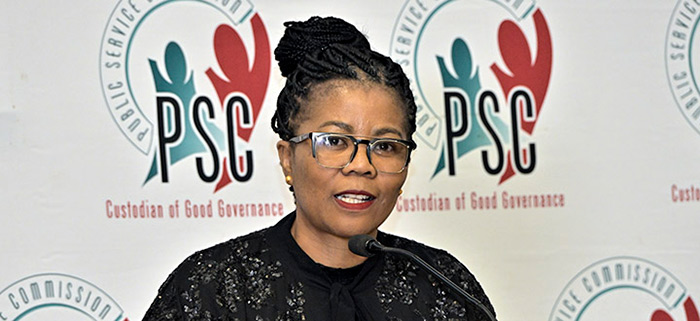
Prof Puleng LenkaBula, Unisa Principal and Vice-Chancellor
Unisa, in partnership with the Public Service Commission (PSC), and the National School of Government, hosted the first Prof Stan Sangweni Memorial Lecture to honour and celebrate the legacy of this apartheid stalwart, rural sociologist and a resolute service delivery champion. Held on 13 September 2025 at Unisa’s Muckleneuk Campus, under the theme Professional and ethical public sector: A catalyst for a developmental state, Sangweni was hailed as an ethician that exemplified and actioned the ideals of public service delivery.
In her welcome address, Unisa’s Principal and Vice-Chancellor (VC), Prof Puleng LenkaBula, stated that Unisa is appreciative of the works of the forebearers and pioneers of South Africa’s democracy, including Sangweni, who dedicated his life to the struggle of liberation from the bonds of colonialism and apartheid. She remarked: "At the dawn of democracy, Sangweni continued to ensure that his legacy, talents and aspirations for building strong public institutions, was affirmed through the diverse works he engaged."
Skilful management of state affairs
The VC expressed that Sangweni’s life was punctuated by impassioned struggle for land rights and ownership. "Land dispossession was the cornerstone of colonialism and apartheid, predicated on establishing a colonial economy through forced removals of Black people from fertile lands, thrust into areas where they became sources of cheap labour in mines, farms and factories, among others," said LenkaBula.
Moreover, the VC argued that the apartheid regime dehumanised Black people, therefore, the works of Sangweni ensured that the philosophies of humanising this racial group during post-apartheid and within the services of government, became the foundation of a just, transparent, accountable and efficient government apparatus. She added: "Sangweni’s efforts to promote integrity in governance go beyond policymaking to include public and practical initiatives to enhance skills, improve service delivery, and to foster a strong sense of duty among government employees mandated to service all South Africans." She continued: "This included the professionalisation of the public sector, strengthened statecraft, and the ability for institutions to serve the ideals of democracy and socio-economic progress."
Therefore, the VC lauded Sangweni for his enduring legacy, stating that his works continue to shape the functions of the public sector. She further explained: "His works also shape the public sector’s prescribed mandates, especially public servants that uphold integrity. It further encourages public servants to ensure that the country and its aspirations are supported by a vibrant democracy through the management of their respective public offices."
An ideal and exemplary democratic state
Prof Somadoda Fikeni, Chairperson of the Public Service Commission, described Sangweni as a rare breed and finest public servant who epitomised ethics and professionalism. "He lived and exemplified that from the beginning of the Public Administration Policy drafting. We should, therefore, invoke and immortalise his trailblazing skills."
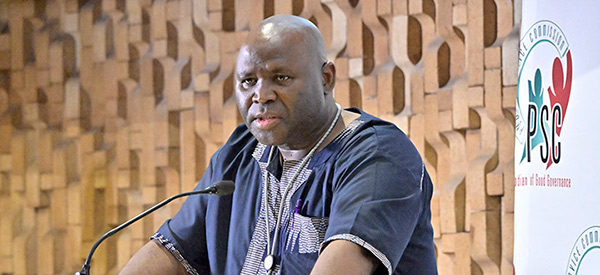
Prof Somadoda Fikeni, Chairperson of the Public Service Commission
Continuing, Fikeni detailed that Sangweni carried excellence whilst working in various national and international organisations within and outside the country, including the United Nations. He also stated that public service is the largest service provider in most countries, and to some degree, the largest employer. "Such services include the provision of water infrastructure, sanitation, policing, electricity, housing and health services," asserted Fikeni. "It is only through public service that people can measure the success or failure of any state or democracy. If we do not have an ethical, professional, capable and developmental public service, despite being guided by the best policies – the state will crumble."
Further, Fikeni stated that Sangweni was among the pioneers of democracy and gave his life to challenging apartheid. "The scourge of apartheid ended, pioneers such as Sangweni, secured hope of a better life for South Africans, paving a way for an ideal democracy with homegrown solutions," he remarked. "Therefore," Fikeni continued, "let us not detour from what Sangweni and other national heroes stood for and exemplified in their quest for a liberated and prosperous South Africa."
Lauding an epitomic servant
In his keynote address, Unisa Chancellor and former President, Dr Thabo Mbeki, said that Sangweni was a priceless gem that advocated for and epitomised honesty in serving the South African people. Mbeki added that South Africa was privileged to have Sangweni, whose professionalism and work experience made him stand out as the best person to lead the process of creating the new ethical PSC. "That was the reason Sangweni led from 1999 to 2009 as the first chairperson of the PSC, established from the prescripts of the 1996 Constitution," he said.
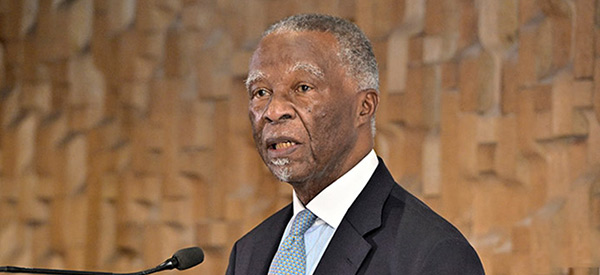
Unisa Chancellor, Dr Thabo Mbeki
Furthermore, Mbeki mentioned broad societal problems that warranted the existence of the PSC. He noted that unethical conduct in the workspace is likely shaped and conditioned by unethical behaviour in the society, including corruption, weak leadership, nepotism, maladministration and poor service delivery by the South African public sector. Mbeki continued: "These are persisting problems, including incidences of violent crimes and gang activities, which impede our constitutional imperatives for a development-oriented public administration."
"Our Constitution," said Mbeki, "visualised the PSC as a critical player in the construction of a democratic South Africa, as featured in the Public Service Act. The commission was created based on the Act, as prescribed by the Constitution, and has enabled the PSC to inspect whether public service departments uphold good governance aligned with their mandates."
Mbeki said that Sangweni ensured that the public sector remains committed to upholding the highest ethical standards to eliminate societal problems. He concluded: "The forthcoming National Dialogue must continue from Sangweni’s works to show the way forward in the creation of a prosperous state led by the principles he upheld and exemplified."
*By Godfrey Madibane, Acting Journalist, Department of Institutional Advancement
**Photography by Shooheima Champion, Unisa Multimedia Centre
Publish date: 2025-09-16 00:00:00.0


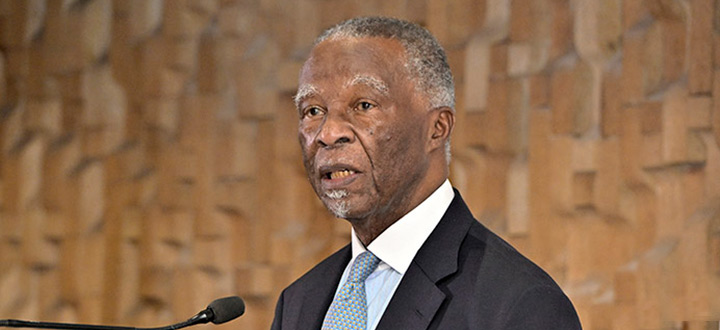 The spirit of Sangweni hailed as the epitome of excellence
The spirit of Sangweni hailed as the epitome of excellence
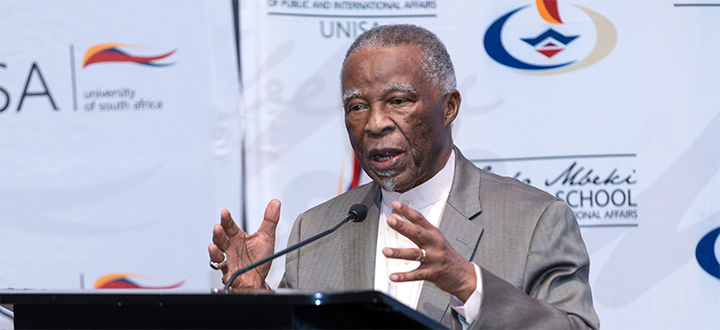 Pursuit of self-interest versus the Pan-African agenda
Pursuit of self-interest versus the Pan-African agenda
 Setting eyes on the goal against the odds
Setting eyes on the goal against the odds
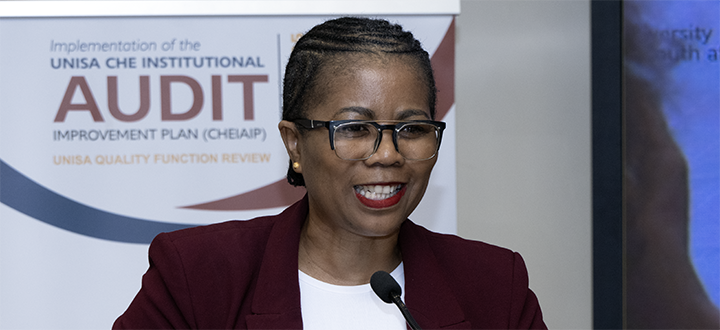 Pioneering open distance and e-learning
Pioneering open distance and e-learning
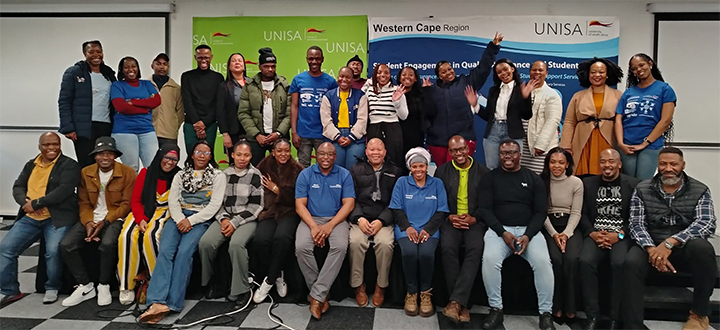 CAS students take centre stage in shaping academic quality and support
CAS students take centre stage in shaping academic quality and support